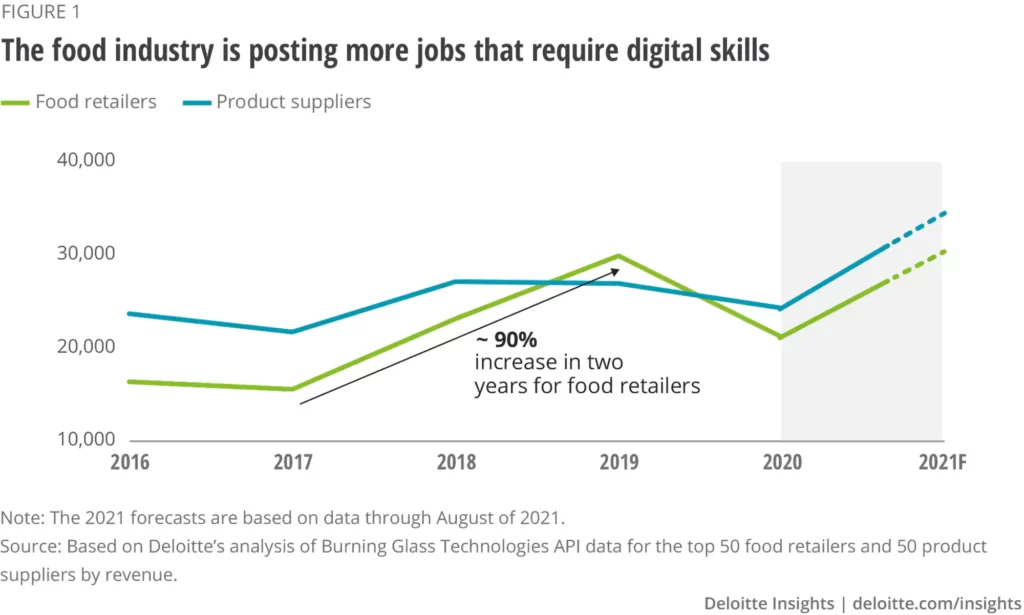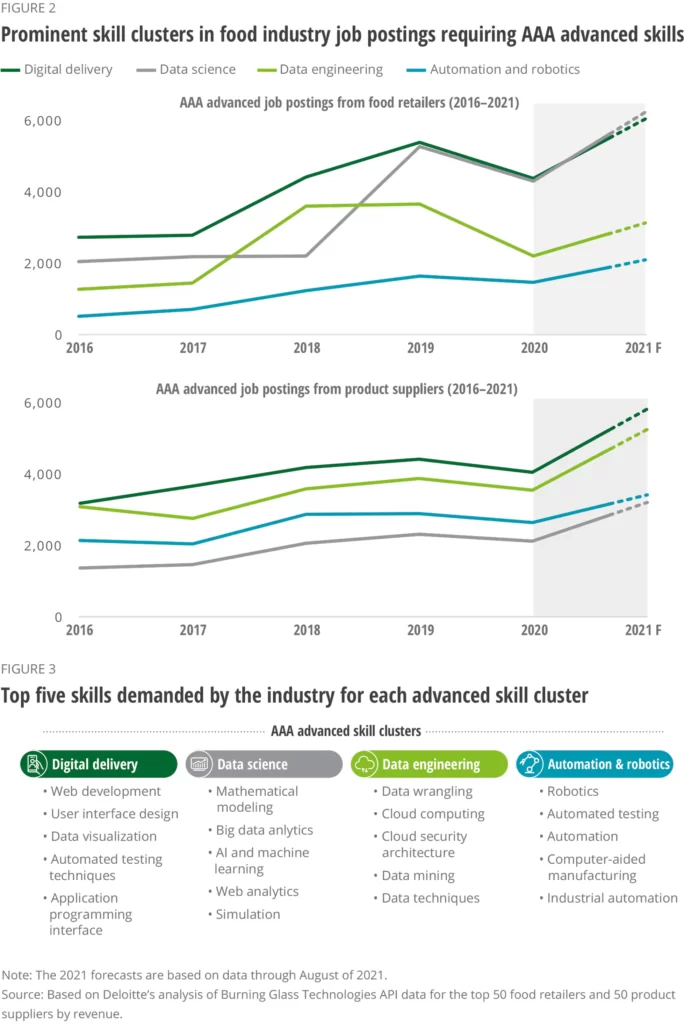Identifying the specific skills needed most
—
Digitization of grocers and product suppliers means new skills are needed for success
Technology may not be the only thing unlocking new possibilities for the future of work, but it is a major driver. The food industry has seen its effect on work through deployments that enable new forms of e-commerce, automate pick-and-pack operations, manage supply chains, forecast production needs, and more. In the process of digital transformation, the industry is rearchitecting work to help enable humans and technology to collaborate more closely and effectively. As one might expect, this requires new kinds of skills—different from the ones traditionally sought by the industry. This is now true for frontline workers as well as for the other employees needed to build, implement, and run the technology systems transforming the industry in the first place.
The shift to digital skills
Deloitte and FMI-The Food Industry Association (FMI) surveyed more than 150 US-based executives at US consumer packaged goods, food manufacturing, and processing companies, as well as grocers and other food retailers.1 Out of the 12 skill types assessed, “digital skills” were indicated to be the ones most likely to increase in value over the next three years, even for the non-managerial, frontline workforce. This was true for product suppliers (95%) and food retailers (92%) alike. This shift to digital skills is also reflected in increased job postings requiring digital skills, which is especially evident for food retailers (figure 1). The rapid increase in such job postings by food retailers that began in 2018 appears to have returned with vigor in 2021, despite a pause during the first year of the pandemic.


Which digital skills are in demand?
A major problem with discussions of digital skills is that they rarely address a key question: “Which digital skills?” Through analysis of client projects across multiple industries, Deloitte has identified a core set of analytics, automation, and artificial intelligence skills—the “AAA skill set”—believed to be key to meeting the technology needs of the work in the future. This skill taxonomy is organized into foundational and advanced skills and further into advanced skill categories. Applied to the food industry, the AAA skill set can both identify and analyze relevant job postings to provide unique insights into the specific digital skills likely most needed by food retailers and suppliers (figures 2 and 3). This approach also captures digital skills turning up in less expected pockets of companies—like operations, human resources, marketing, or finance functions—in addition to traditional IT departments.


A top-level data view reflects a more significant transformation underway among food retailers than product suppliers. But that’s not because product suppliers are behind. In fact, the manufacturers and food processors that constitute product supplier brands have long deployed a significant number of digital skills. For example, in 2016, only about 7% of food retail postings in the dataset required AAA skills compared to about 20% of supplier postings. Supplier postings reflect a steady march in growing their digital skills base in relatively the same proportions as past years. It is an indication that the basics of the business have not changed as significantly.
Food retailers, however, show a significant change in both volume and kind of advanced digital skills sought.
- Digital delivery: These are the skills needed to build applications for end-users, both external and internal, such as e-commerce and employee scheduling. Food retailers started ramping postings for these skills aggressively in 2018 and demand has continued to grow.
- Data engineering: These skills are data infrastructure related. Job postings for data engineering grew dramatically in 2018. However, they leveled off subsequently, likely an indication that the data infrastructure was now largely in place.
- Data science: Demand for these skills didn’t spike until 2019, after the data infrastructure was in place to support their work. Demand remains exceptionally high among food retailers, on par with digital delivery.
- Automation: These skills are used for both robotic and more software- or process-based automation. While the need for these skills is ramping up steadily, job postings do not reflect a fundamental shift in the need for these skills. With “dark stores” and other pick-and-pack automation stories in the news, one might have expected a large jump in job postings for automation skills. However, these skills are likely being obtained more through third-party vendors than from in-house hiring. In future years, as food retailers shift from “build” to “operate” mode, more of these skills may be hired in-house.
What’s happening and what could change?
Interviews with industry executives and Deloitte client practitioners suggest even more is happening beneath the surface. For instance, food companies are hiring these digital skills for all departments, not just in traditional IT departments. In fact, our interviews reveal that most of the important digital innovation is likely being driven by parts of the business outside of IT. This change coincides with a shift from program- or project-based management of technology to a more customer-centric and modern product management approach. Digital teams are using agile methods, such as scrum, to build applications centered on external and internal customers, both of whom are more digitally savvy and have higher expectations for what applications should deliver. For example, store associates are being provided applications for facilitating pick-and-pack shopping, interacting with customers through text, taking mini training courses, and managing their schedules.
In part because they will use these applications, job postings for frontline employees are also now frequently listing a requirement for some form of digital skills. For example, the analysis for retail revealed that one in four job postings for cashiers as well as retail store associates, plus three in four job postings for sales representatives, required digital skills. By 2020, the demand for digital skills among cashiers specifically was five-fold higher than 2017 levels. There are examples among product suppliers as well. Nine in 10 job postings for scheduler/operations coordinators as well as service supervisors required digital skills.
Food retailers currently are going through a bigger shift in their digital skills hiring but there are developments on the horizon that could disrupt product supplier hiring patterns as well. Perhaps foremost is a need to provide greater transparency throughout the supply chain and meet expanded sustainability goals. Digital systems and associated skills are needed to capture, integrate, and make sense of the data to drive these transparency and sustainability functions. A scale up in direct-to-consumer (DTC) channel sales, more private-label competition from web retailers with deeper data on customers, or a move to small-batch manufacturing and niche brands (e.g., personalized food-as-medicine offerings) could also shake up digital skill needs by necessitating more digitally driven business models to deliver and compete.
Facing the challenge ahead
The food industry is far from finished in its digital transformation and journey to a new future of work. Given how difficult it is for the industry to find enough workers right now, let alone those with the digital skills sought out almost universally, it is tempting to start a scramble for technology talent. However, another approach is likely to work better. Food industry companies should first ask themselves some important questions in a broader future of work context:
- Are we taking the time to think through the actual new work to be done and rearchitect it in ways that will allow our people and technology to work together and perform at their best?
- When redesigning work, are we putting the employee at the center, and complimenting their experience through these new and more interesting technologies and skills they get to use?
- Is our company creating a sense of belonging for everyone? Will our approach to diversity, equity, and inclusion, our social stands, and our contributions to sustainability make it easier to win over digital talent?
- Does our company culture embrace technology or are we traditionally hesitant? How well does our leadership, from the CEO on down, model the culture we want?
Taking a step back to understand the answers to these big questions should not imply there is plenty of time. In fact, several executives indicated that organizations are not planning or moving with enough urgency. First steps toward addressing digital skill needs should include the following:
- Start with an inventory of current capabilities and identify the major digital skill gaps. Companies should know their gaps before making decisions on spending and partnering.
- Take an honest look at which digital skills can be gained through training and which will require bringing in new people. Allow the current workforce to surprise you. Provide opportunities and options for employees to demonstrate their skills and opt in to take additional training where appropriate.
- Refresh your job postings. You won’t get the skills if you don’t ask. Make sure the skill needs uncovered in the assessment actually make their way to the job descriptions and that recruiters know the plan. This is also an opportunity to experiment with new, digital-forward messaging, and adjust screening filters.
- Communicate with your people. Let them know where the company is headed, the plan for filling digital skill needs, and what is expected of them. Listen to them as well. Your workforce may have ideas for where to seek new sources of talent, what messages would work better, and how to make the roles more attractive.
(Courtesy EY. By Barb Renner, Vice Chair & US Leader | Consumer Products. Kimberly Betts, United States Justin Cook, United States Jagadish Upadhyaya, India)












